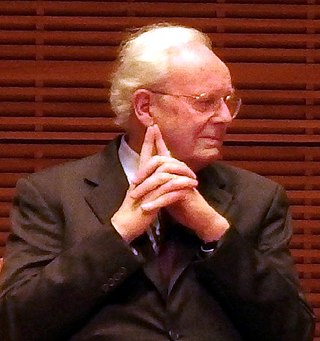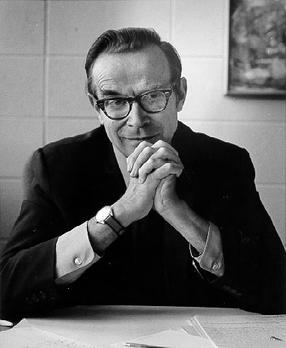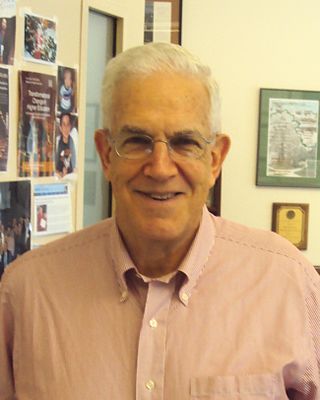Related Research Articles

Lactose intolerance is caused by a lessened ability or a complete inability to digest lactose,a sugar found in dairy products. Humans vary in the amount of lactose they can tolerate before symptoms develop. Symptoms may include abdominal pain,bloating,diarrhea,flatulence,and nausea. These symptoms typically start thirty minutes to two hours after eating or drinking something containing lactose,with the severity typically depending on the amount consumed. Lactose intolerance does not cause damage to the gastrointestinal tract.

Walter Fredrick LaFeber was an American academic who served as the Andrew H. and James S. Tisch Distinguished University Professor in the Department of History at Cornell University. Previous to that he served as the Marie Underhill Noll Professor of History and a Stephen H. Weiss Presidential Fellow at Cornell.

A metapopulation consists of a group of spatially separated populations of the same species which interact at some level. The term metapopulation was coined by Richard Levins in 1969 to describe a model of population dynamics of insect pests in agricultural fields,but the idea has been most broadly applied to species in naturally or artificially fragmented habitats. In Levins' own words,it consists of "a population of populations".
The Cornell University Department of History is an academic department in the College of Arts and Sciences at Cornell University that focuses on the study of history. Founded in 1868,it is one of Cornell's original departments and has been a center for the development of professional historical research institutions in the United States,including the American Historical Association and the American Historical Review. It remains a highly-ranked program in the field and its alumni and faculty have won Nobel and Pulitzer Prizes,among other distinctions. In addition,three of Cornell's presidents have served among its ranks.
Daniel R. Schwarz is Frederick J. Whiton Professor of English Literature and Stephen H. Weiss Presidential Fellow at Cornell University,where he has taught since 1968. He has directed nine NEH seminars and has lectured widely in the United States and abroad,including a number of lecture tours under the auspices of the academic programs of the USIS and the State Department. He was a founding member of the Society for the Study of Narrative Literature and served as its President from 1990 to 1991. He has held three endowed visiting professorships. He was a guest Fellow for short periods at Oxford (Brasenose) and Cambridge (Girton) in the UK. He has been the President of the Cornell Phi Beta Kappa chapter since 2009. He is the author of eighteen significant books and numerous articles,many of which have appeared in prestigious journals and collections of essays.
Benjamin Batson (1942–1996) was an American mathematician and historian who studied 20th century Thai history. He spent almost his entire professional life in Southeast Asia.
George William Skinner was an American anthropologist and scholar of China. Skinner was a proponent of the spatial approach to Chinese history,as explained in his Presidential Address to the Association for Asian Studies in 1984. He often referred to his approach as "regional analysis," and taught the use of maps as a key class of data in ethnography.

George McTurnan Kahin was an American historian and political scientist. He was one of the leading experts on Southeast Asia and a critic of United States involvement in the Vietnam War. After completing his dissertation,which is still considered a classic on Indonesian history,Kahin became a faculty member at Cornell University. At Cornell,he became the director of its Southeast Asia Program and founded the Cornell Modern Indonesia Project. Kahin's incomplete memoir was published posthumously in 2003.
John Thayer Sidel is a political scientist and is the Sir Patrick Gillam Professor of International and Comparative Politics at the London School of Economics (LSE),where he is affiliated with both the Department of Government and International Relations department,as well as the Asia Research Centre.

Scott Gates is an American political scientist and economist based in Norway. He was director of the Peace Research Institute Oslo (PRIO)'s Centre for the Study of Civil War (CSCW),which was a Norwegian Center of Excellence funded by the Research Council of Norway for a twelve-year period 2002-2013. He is currently a Research Professor at PRIO,a Guest Researcher at ESOP in the Department of Economics at the University in Oslo and also holds a professorship in the Department of Political science at the University of Oslo. He used to work at the Norwegian University of Science and Technology (NTNU) and Michigan State University (MSU).
The Southeast Asia Program (SEAP) was founded in 1950 to promote the acquisition and dissemination of knowledge about countries,cultures and languages of the region. It is an interdisciplinary program of Cornell University that focuses on the development of graduate training and research opportunities on the languages and cultures of Brunei,Burma,Cambodia,Indonesia,Laos,Malaysia,the Philippines,Singapore,Thailand,and Vietnam. Cornell University is known for being the "Mecca of Southeast Asian studies."

Ronald Gordon Ehrenberg is an American economist. He has primarily worked in the field of labor economics including the economics of higher education. Currently,he is Irving M. Ives Professor of Industrial and Labor Relations and Economics at Cornell University. He is also the founder-director of the Cornell Higher Education Research Institute (CHERI).
The Jeffrey Cheah Institute on Southeast Asia (JCI) is an independent Malaysian think tank established in March 2014 with a focus on key public policy concerns in Southeast Asia. It is based at Sunway University in the Malaysian state of Selangor.

Suzanne Mettler is an American political scientist and author,known for her research about the way Americans view and respond to the government in their lives,and helping to stimulate the study of American political development.
Barbara Geddes is an American political scientist. One of the main important theorists of authoritarianism and empirical catalogers of authoritarian regimes,she is currently a Professor Emeritus at the Department of Political Science at the University of California,Los Angeles. Her 2003 book Paradigms and Sand Castles is an influential research design book in comparative politics.
Geoffrey "Geoff" William Coates is an American chemist and the Tisch University Professor in the department of chemistry and chemical biology at Cornell University.
Sara Wallace Goodman is an American political scientist. She is an associate professor of Political Science at the University of California,Irvine.
Persistence studies is scholarship in the social sciences that links,usually through quantitative causal inference,historical events with later political,economic and social outcomes. It is particularly prevalent in economics,economic history,political science,and sociology. The scholarship emerged in the early 2000s. Early landmark studies include two studies by economists Daron Acemoglu,Simon Johnson,and James Robinson in 2001 and 2002 that linked colonial institutions to variations in contemporary economic outcomes.
References
- ↑ "Thomas Pepinsky | Lowy Institute". www.lowyinstitute.org. Retrieved 2022-10-07.
- ↑ "Thomas Pepinsky | Department of Government". government.cornell.edu. Retrieved 2022-10-07.
- ↑ "Editorial board". Cambridge Core. Retrieved 2024-10-08.
- 1 2 3 Pepinsky, Thomas (April 11, 2022). "CV of Thomas B. Pepinsky".
- ↑ "Department of Music". music.cornell.edu. Retrieved 2022-12-07.
- 1 2 3 "Thomas Pepinsky". Brookings. 2018-10-31. Retrieved 2022-10-07.
- ↑ "30 Arts & Sciences faculty honored with endowed professorships | Department of Government". government.cornell.edu. Retrieved 2022-10-07.
- ↑ Pepinsky, Thomas B.; Goodman, Sara Wallace; Ziller, Conrad (February 2024). "Modeling Spatial Heterogeneity and Historical Persistence: Nazi Concentration Camps and Contemporary Intolerance". American Political Science Review. 118 (1): 519–528. doi:10.1017/S0003055423000072. ISSN 0003-0554.